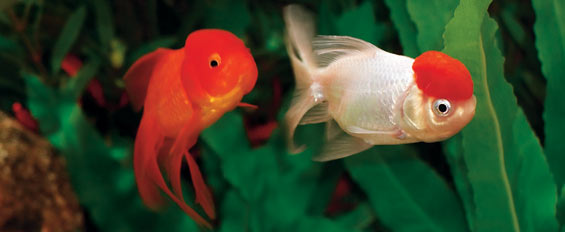
The Oranda is one of several varieties of what is commonly known as the
Fancy Goldfish, which originally came from parts of Asia, Japan, and China but now enjoys worldwide distribution due to controlled breeding programs. Resembling the Veiltail and Fantail varieties, the Oranda's distinction is in the "hood" that covers its head. The hood begins developing at about 6 months of age.
The Oranda is typically a metallic-scaled fish and comes in a wide variety of colors. Some of the variations are called Red Cap, Red, Red and White, Chocolate (copper brown), Blue (grey/blue), Black, Black and Red, Panda and Calico. In the case of the Red Cap Oranda, the hood is a predominant, bright red, while the body is an iridescent white. The Red, Chocolate, Blue, and Black Oranda are solid color, while the remaining are multiple colors in an infinite possibility of patterns.
All goldfish are members of the carp group and are generally quite hardy. The Oranda will do well in a pond of 250 gallons of water or more with plenty of hardy, cold water plants. Pond owners in Zone 4 or colder should winter them indoors.
Breeding often results in up to 1,000 fish eggs, with fry hatching in five to six days.
Orandas are slow-moving fish that should be kept with other fancy goldfish. Due to the aggressive feeding behavior of koi, a koi pond is not a suitable home for Oranda.
Mature goldfish are omnivorous, and will eat all types of dried and live
foods. Limit protein, however, to 30% of the diet, and feed a slowly sinking diet so they don't have to "gulp" at the surface, which may lead to swim bladder infections.
| Interesting Facts: |
| Species: |
Carassius auratus |
| Origin: |
China, Asia, Japan |
| Size: |
Up to 10 inches |
| Diet: |
Omnivore |
| Pond Setup: |
A minimum of 2 feet deep |
| Pond Conditions: |
pH between 6.5-7.5; dH 2-12 |
| Min. Pond Capacity: |
250 gallons |
| Temperament: |
Peaceful and slow-moving. Watch when feeding if kept with faster moving fish. |
| Swimming Level: |
Middle level of pond |
| Care Level: |
Easy |
| Reproduction: |
Egg Scatter |
|
|